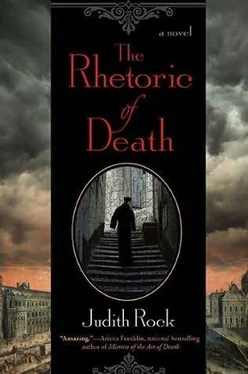Judith Rock - The Rhetoric of Death
Здесь есть возможность читать онлайн «Judith Rock - The Rhetoric of Death» весь текст электронной книги совершенно бесплатно (целиком полную версию без сокращений). В некоторых случаях можно слушать аудио, скачать через торрент в формате fb2 и присутствует краткое содержание. Жанр: Исторический детектив, на английском языке. Описание произведения, (предисловие) а так же отзывы посетителей доступны на портале библиотеки ЛибКат.
- Название:The Rhetoric of Death
- Автор:
- Жанр:
- Год:неизвестен
- ISBN:нет данных
- Рейтинг книги:3 / 5. Голосов: 1
-
Избранное:Добавить в избранное
- Отзывы:
-
Ваша оценка:
- 60
- 1
- 2
- 3
- 4
- 5
The Rhetoric of Death: краткое содержание, описание и аннотация
Предлагаем к чтению аннотацию, описание, краткое содержание или предисловие (зависит от того, что написал сам автор книги «The Rhetoric of Death»). Если вы не нашли необходимую информацию о книге — напишите в комментариях, мы постараемся отыскать её.
The Rhetoric of Death — читать онлайн бесплатно полную книгу (весь текст) целиком
Ниже представлен текст книги, разбитый по страницам. Система сохранения места последней прочитанной страницы, позволяет с удобством читать онлайн бесплатно книгу «The Rhetoric of Death», без необходимости каждый раз заново искать на чём Вы остановились. Поставьте закладку, и сможете в любой момент перейти на страницу, на которой закончили чтение.
Интервал:
Закладка:
He sprang with part of the sentence still in his mouth. As he knocked Charles to the floor, flipped him onto his belly, and straddled him, gunfire echoed off the courtyard walls.
Chapter 36
Charles lay rigid, not knowing who had fired the shot or which of them had been its target.
“Charles, oh, dear God, Charles, don’t be dead!” Pernelle fell to her knees beside him. And jumped up with a smothered sob as someone vaulted onto the stage.
The light from a swinging lantern made Charles blink. Shoes crossed his line of vision and Moulin’s weight was rolled off his back. A large hand framed in lace reached down.
“Are you hurt?” Lieutenant-General La Reynie pulled Charles up and holstered a pistol with his other hand.
Feeling at his wound to see if it was bleeding again, Charles shook his head. Pernelle had withdrawn to the edge of a wing, a hand pressed to her mouth, her eyes enormous in her white face.
A man with a bloodied bandage around his arm held the lantern over Moulin’s body.
“That’s him.” The words were full of grim satisfaction.
La Reynie nodded. “Go back to the Chatelet, let them see to you,” he said to the man.
Charles stared at what had been Moulin, trying to pray for the man’s twisted, violently dispatched soul and failing utterly. He looked up. “I owe you my life, M. La Reynie.”
“It was one of my men who shot him.”
“How did you know to come here?”
“When Guise left the Hotel de Guise, two of my men followed him. This Moulin must have been watching the Guise house, too, because he followed my men. One of my officers realized he was there and doubled back to question him. Moulin killed him for his trouble and wounded the one who just left, but that one got word back to me at the Chatelet. I guessed Guise would come here and thank God I guessed right.” La Reynie gave Charles an appreciative nod. “You did well to keep Moulin talking. Did you know we were in the courtyard?”
“I knew someone was. You heard what Moulin said?”
“Most of it. Enough.”
Hurrying footsteps made them turn.
“Maitre! Thank God!” Pere Le Picart rested trembling hands on Charles’s shoulders. “You are not hurt?”
Charles shook his head. “It’s finished, mon pere,” he said gently. “It’s over.” He nodded toward the bodies. “Frere Moulin was behind it all, not Frere Fabre. But he was working for Pere Guise, as was Mme Doute.”
Briefly, Charles and La Reynie told the rector what had happened and what they’d learned.
“It is not finished,” Le Picart said into the quiet that fell then. “Not for their souls.” He looked from Moulin’s splayed body to Guise’s, lying in a glistening pool of blood. “I failed them. I was their superior, I stood as their father in religion. I should have known, I should have seen…”
“They made their own evil, mon pere,” La Reynie said brusquely.
“As do we all.” The rector knelt between the bodies and began to pray for his lost “sons.”
Lieutenant-General La Reynie went down into the courtyard to talk to his men and Charles went to find Pernelle. She was sitting in the dark corner of a wing with her face in her hands.
“Are you all right?” He touched her shoulder. “I’m sorry you had to see this.”
A sob caught in her throat. “I thought you were dead.”
“So did I for a moment.” Charles held on to a side flat, thinking that he might still die from sheer exhaustion. “Can you stay hidden a little while more? La Reynie seems to have forgotten you and I want to keep it that way. I’ll get us away as soon as I can.”
A sudden beam of light sent Charles’s heart into his throat.
“Emotional, isn’t he, your young friend?” La Reynie stood behind Charles, holding the lantern high and looking at Pernelle. “As emotional as a girl. From the south, too, I hear in his voice. An unusual coincidence.”
“I’ll see him home shortly.” Charles started back through the narrow passage between the wings and La Reynie had to retreat in front of him. Charles stopped close to the wings, so as not to disturb Le Picart, who was still praying. As a distraction from Pernelle, but also because he wanted to know, Charles asked, “Is it true, Monsieur La Reynie, about the child and Mme Doute? Are they dead?”
“I’ve sent someone to find out for certain.”
Charles looked at the rector, bent low as though the deaths Guise had caused hung on his own soul, and thought about the other deaths, Huguenot deaths, that Guise had helped to cause. “Monsieur La Reynie,” he said abruptly, “you told me that you protect the Huguenots still in Paris.”
“What of it?” La Reynie said warily.
“You heard what Moulin said about the dragonnades? French dragonnades, I mean.”
“I heard.”
“You can use what you heard to stop them.”
Le Reynie looked pityingly at him. “I cannot.”
“Why not? Do you want more of this?” Charles gestured angrily at the bodies, the priest, the blood.
La Reynie did not respond.
“Oh, I see.” Helplessness rose in Charles’s throat like bile. “I beg your pardon. I should have known. After all, I first saw you talking to Guise and Louvois. An unholy trinity, I thought you were then. I had come to think differently, but you are telling me I was right the first time. Death does not trouble you.”
La Reynie’s eyes blazed red in the torchlight and he struck Charles a blow on the cheek that sent him crashing into a wing. Two of La Reynie’s men, stooping to lift Guise’s body onto a board, started toward Charles, but La Reynie shook his head and they held where they were. For a long perilous moment, he and Charles faced each other, both their faces dark with anger.
Then the lieutenant-general shut his eyes and turned his head away. “I watched my first wife die.” His shaking voice was a thread of sound for only Charles to hear. “And three of my children.” He opened his eyes and stepped close to Charles. “You are a celibate, you will never know the pain of any of that! You may be very sure that death bothers me. I see death most days. And of course I have a part in the dragonnades. So do you and every other faithful Catholic, if you choose to look deeply enough. You blind innocent, I will spell it out for you. And if you talk, you may well find yourself dead. Our war minister Louvois has become too powerful for the comfort of many highly placed men. Many of whom not only hate him, they fear him. And his ambition.” La Reynie’s softly furious words sounded like grease spitting in a hot pan. “Everyone knows that Louvois keeps the dragonnades going for Louis. But few know that Guise was Louvois’s confessor. Which means that Guise knew Louvois’s secrets like no one else, and Louvois’s secrets are not only legion, but potentially perilous to Louvois. When I learned that he was Guise’s penitent, I began to wonder if I might get some hold over Guise and trade with him for some threat I could use to curb Louvois’s power. Then someone-and I was sure it was someone in your college-started killing. And I recruited you. Now, thanks in great part to you and your rector, I have this English plot to hold over Louvois’s head.”
“What about Lysarde’s murder and the Dutchman’s-or whoever he was? When you told me those two were dead, I had the strong feeling that you assumed Louvois was responsible.”
“No doubt. But there will be no proving it.”
“What about the dragonnades, then? You can prove those, you can stop them!”
“How can they be stopped when officially they do not occur? The man who makes Louis admit they go on at all is finished.”
Charles shook his head in disgust. Louvois had said exactly that to Guise. “And so we are back where we were,” he flung at La Reynie. “You will not risk your comfortable position.”
Читать дальшеИнтервал:
Закладка:
Похожие книги на «The Rhetoric of Death»
Представляем Вашему вниманию похожие книги на «The Rhetoric of Death» списком для выбора. Мы отобрали схожую по названию и смыслу литературу в надежде предоставить читателям больше вариантов отыскать новые, интересные, ещё непрочитанные произведения.
Обсуждение, отзывы о книге «The Rhetoric of Death» и просто собственные мнения читателей. Оставьте ваши комментарии, напишите, что Вы думаете о произведении, его смысле или главных героях. Укажите что конкретно понравилось, а что нет, и почему Вы так считаете.












